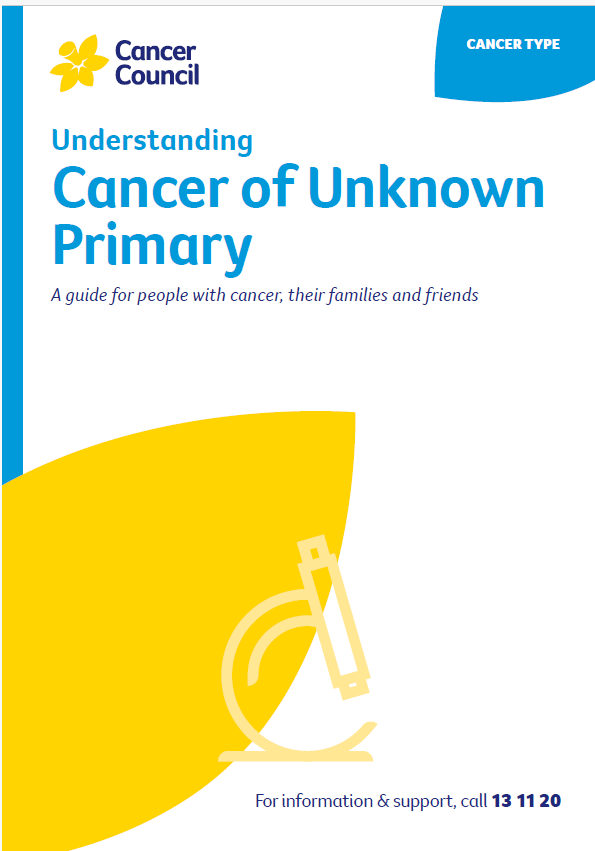- Home
- Cancer of unknown primary (CUP)
- Diagnosis
- Your health care team
Your health care team
Your GP will arrange the first tests to assess your symptoms. If these tests do not rule out cancer, you will usually be referred to a specialist for further tests.
The type of specialist you see will depend on your symptoms, the suspected location of the cancer and the types of tests you need.
For example, you may see a:
- gastroenterologist (digestive tract, bowel or stomach)
- gynaecologist (female reproductive system)
- urologist (urinary tract or kidneys; male reproductive system)
- respiratory physician or thoracic surgeon (chest and lung)
- neurosurgeon (brain and spinal cord)
- ear nose and throat surgeon
- haematologist (blood cells).
Sometimes your main specialist will be a medical oncologist who treats all types of cancer.
If cancer is diagnosed, the specialist will consider treatment options. Often these will be discussed with other health professionals at what is known as a multidisciplinary team (MDT) meeting. During and after treatment, you will see a range of health professionals who specialise in different aspects of your care.
To find cancer specialists, multidisciplinary teams and hospitals in NSW or ACT, you can visit the NSW Government website CanRefer.
Health professionals you may see
| GP | assists you with treatment decisions and works in partnership with your specialists in providing ongoing care |
| medical oncologist | treats cancer with drug therapies such as chemotherapy, targeted therapy and immunotherapy (systemic treatment) |
| surgeon | surgically removes tumours and performs some biopsies; specialist cancer surgeons are called surgical oncologists |
| radiation oncologist | treats cancer by prescribing and overseeing a course of radiation therapy |
| radiologist | analyses x-rays and scans; an interventional radiologist may also perform a biopsy under ultrasound or CT, and deliver some treatments |
| pathologist | examines cells and tissue samples to determine the type and extent of the cancer |
| nurse or nurse practitioner | administers drugs and provides care, information and support throughout treatment; a nurse practitioner works in an advanced nursing role and may prescribe some medicines and tests |
| palliative care specialists and nurses | work closely with the GP and cancer team to help control symptoms and maintain quality of life |
| pharmacist | dispenses medicines and gives advice about dosage and side effects |
| dietitian | helps with nutrition concerns and recommends changes to diet during treatment and recovery |
| physiotherapist, exercise physiologist | help restore movement and mobility, and improve fitness and wellbeing |
| social worker | links you to support services and helps you with emotional, practical and financial issues |
| psychologist, psychiatrist | help you manage your emotional response to diagnosis and treatment |
| cancer care coordinator | coordinates your care, liaises with other members of the MDT and supports you and your family throughout treatment; may be a clinical nurse consultant (CNC) or clinical nurse specialist (CNS) |
Video: Your health care team for CUP
More resources
Prof Chris Karapetis, Network Clinical Director (Cancer Services), Southern Adelaide Local Health Network, Head, Department of Medical Oncology, and Director, Clinical Research in Medical Oncology, Flinders Medical Centre and Flinders University, SA (Clinical review); Dr Amey Aurangabadkar, Radiologist, Illawarra Radiology Group, NSW; Clare Brophy, Consumer; Prof Katherine Clark, Clinical Director of Palliative Care, NSLHD Supportive and Palliative Care Network, Northern Sydney Cancer Centre, Royal North Shore Hospital, NSW; Prof Wendy Cooper, Senior Staff Specialist, Tissue Pathology and Diagnostic Oncology, NSW Health Pathology, Royal Prince Alfred Hospital, NSW; A/Prof Richard Gallagher, Head and Neck Surgeon, Director of Cancer Services and Head and Neck Cancer Services, St Vincent’s Health Network, NSW; Dr Chloe Georgiou, Oncology Research Fellow, Australian Rare Cancer Portal, and Oncology Trials Fellow, Bendigo Health Cancer Centre, VIC; Dr Susan Harden, Radiation Oncologist, Peter MacCallum Cancer Centre, VIC; Justin Hargreaves, Medical Oncology Nurse Practitioner, Bendigo Health Cancer Centre, VIC; Dr Laura Kirsten, Principal Clinical Psychologist, Nepean Cancer Care Centre, NSW; Prof Linda Mileshkin, Medical Oncologist, Peter MacCallum Cancer Centre, VIC; Caitriona Nienaber, 13 11 20 Consultant, Cancer Council WA.
View the Cancer Council NSW editorial policy.
View all publications or call 13 11 20 for free printed copies.

